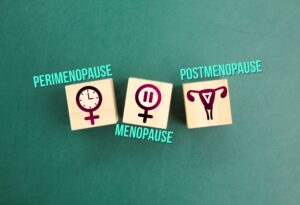What’s the Difference between the Menopause and Perimenopause?
Women are born with their full complement of eggs or follicles. At puberty, we start to develop these follicles every month and the dominant one gets ovulated.
The perimenopause is when a woman’s ovaries start to produce fewer follicles and oestrogen levels fall. Ovulation can be erratic, and periods may start to change, either becoming heavier and longer or sometimes irregular. The lower oestrogen levels can cause symptoms like hot flushes, brain fog, aches and pains and mood swings. This is a process which can take many years. The actual menopause is a retrospective diagnosis when ovulation has completely stopped. We can safely say this has happened when a woman has had no periods for 2 years before the age of 50, and one year after age 50.
So, during the time of the Perimenopause, from about age 40 until menopause is complete, women can actually still get pregnant. It’s therefore important to talk to your doctor about contraception if you do not want to conceive a “Lagniappe”!
Some women may go through an early menopause – if their periods stop before age 45, or a premature menopause if their periods stop before age 40. This can have devastating psychological and physical consequences and these women should be offered HRT unless there is a reason they cannot have it.
Other women may be put into menopause earlier than they would have naturally, because of certain drugs, chemotherapy or even surgery to remove the ovaries. They too should be offered HRT unless there is a reason why they cannot have it.
Although most of the time the process of the menopause and perimenopause is a “natural” one, it comes at a busy time in a Woman’ life when she may be at her peak earning power at work, or when she has teenagers at home and older parents to care for also: The so called “Sandwich” years. It seems unfair to be having to deal with all of this plus brain fog and other debilitating symptoms if it’s not necessary to have to put up with these. After all, greying hair is “Natural” but we don’t have to put up with that if we don’t want to do we?
Stay tuned for Part 2: How we can alleviate these debilitating and unnecessary symptoms.




